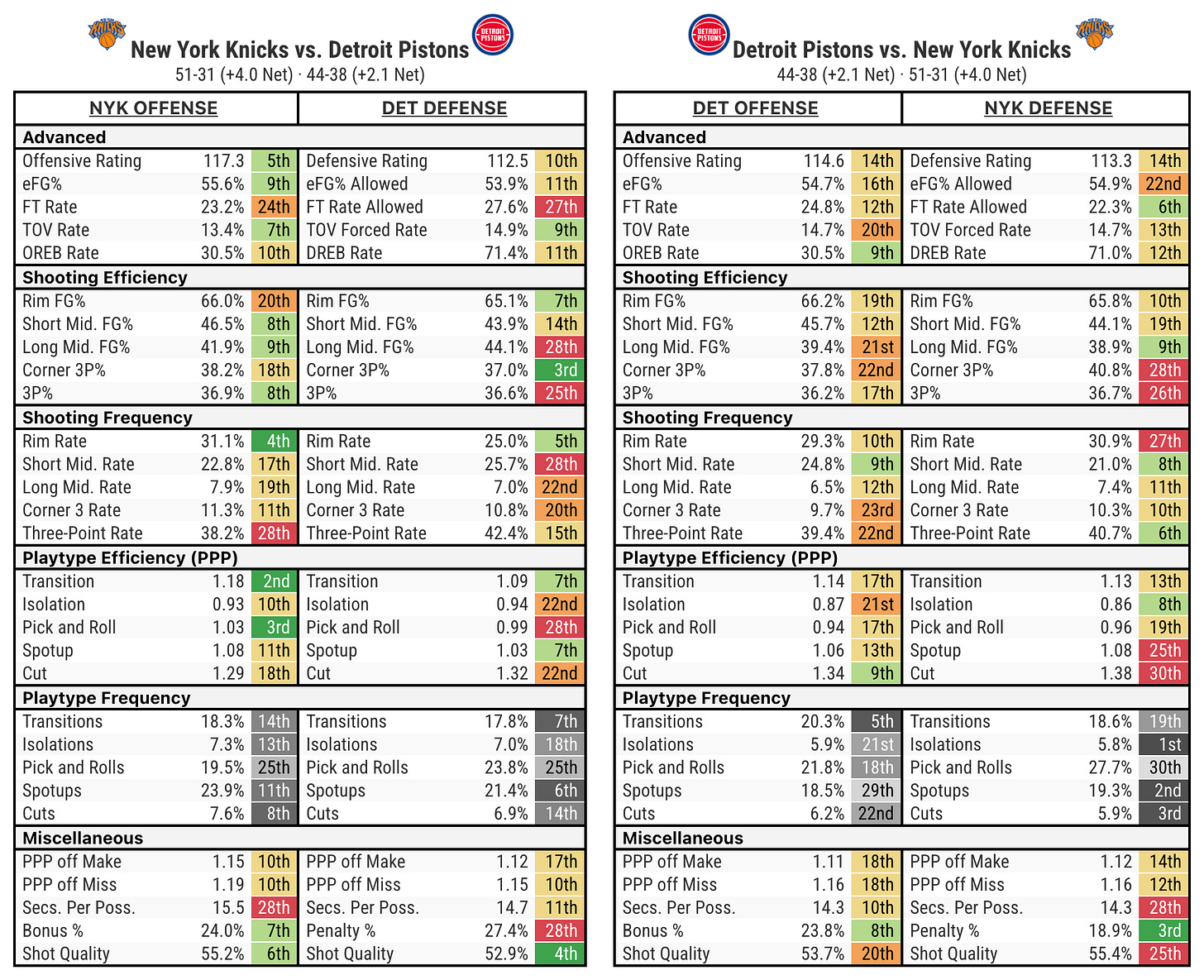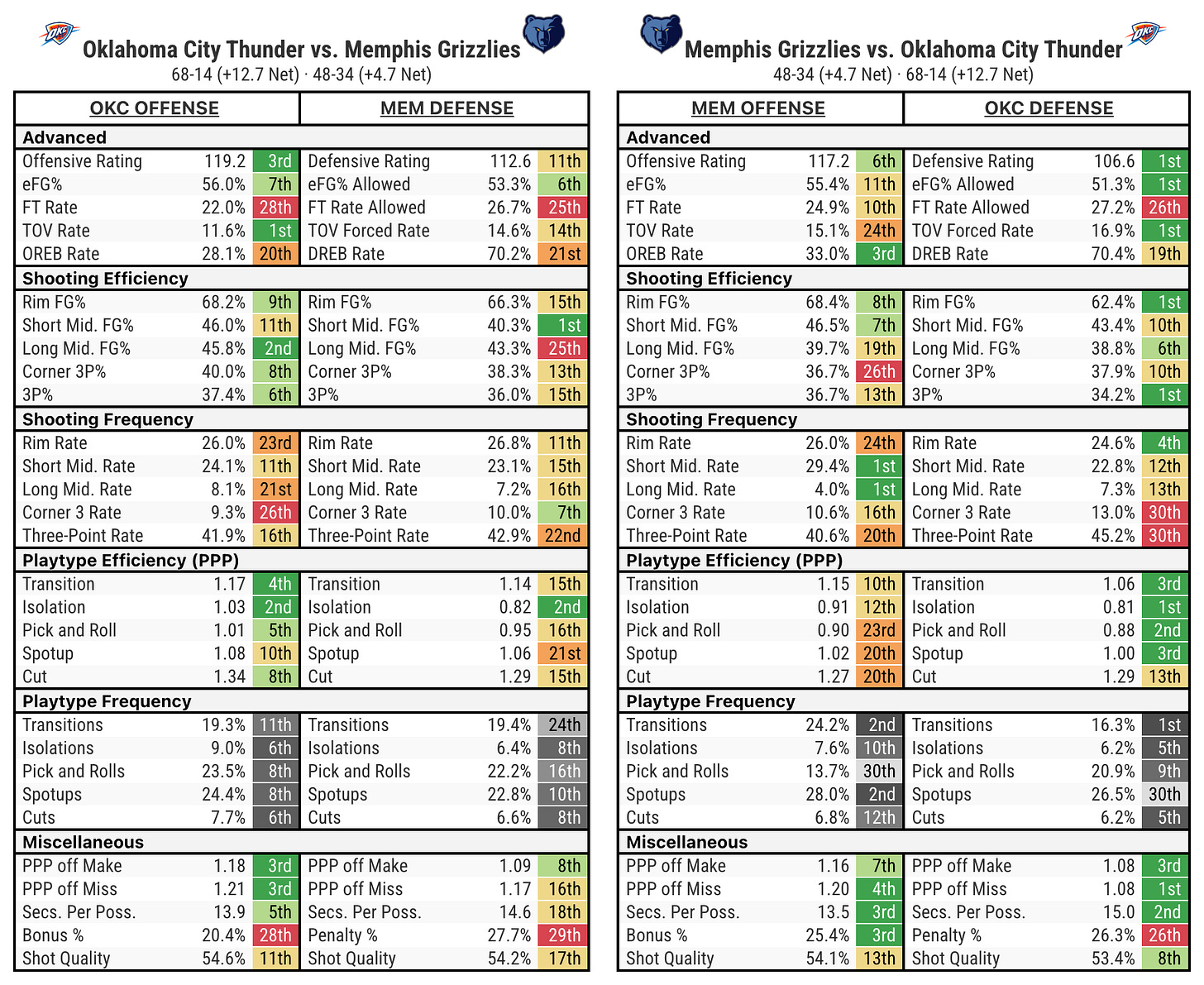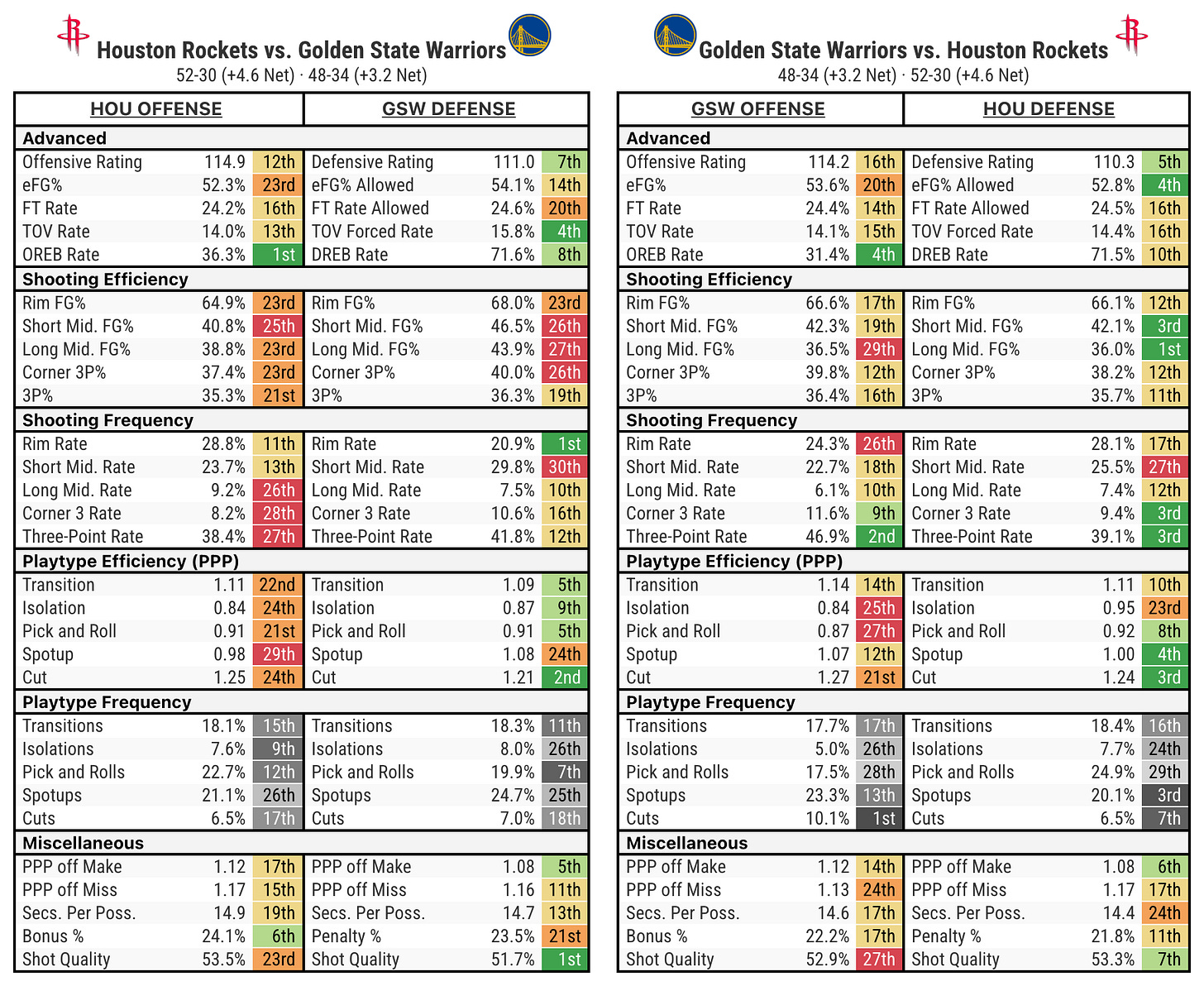The NBA Has Entered Its Weak Link Era
Some postseason thoughts for the nerds and for the birds
Happy opening day of the NBA playoffs. Before the games get underway, I wanted to share some overarching thoughts about where I think the NBA is headed and I how think it’ll manifest itself in this year’s playoffs. I’ve also created some nifty analytics cheat sheets for each playoff series. Paid subscribers to The F5 can expect to receive a tutorial on how to recreate these graphics in R within a day or two.
As a reminder, The F5 is a one hundred percent reader supported publication. It exists because several hundred of you have decided that receiving an extra email a week is worth the small cost of about one espresso beverage per month. Upgrading to a paid subscription is the best way to support The F5. The second best way is to tell a friend about it.
The NBA Enters Its Weak Link Era
In 2011, Chris Anderson and David Sally published a book about soccer analytics called The Numbers Game. In the book, the authors described a key difference between sports like basketball and soccer. According to Anderson and Sally, basketball is a strong link sport. A strong link sport is one where the team with the best player usually wins. In basketball terms, that means if you’ve got Michael Jordan or LeBron James on your team, you usually win. That’s different from soccer, which the authors classified as a weak link sport. In weak link sports, the team without the worst player usually wins.
The takeaway, according to the authors, is this:
If you want to build a team for success, you need to look less at your strongest links and more at your weakest ones. It is there that a team’s destiny is determined, whether it will go down in history or be forever considered a failure.
I think this framework is key to understanding how the NBA works in 2025. Looking at basketball through the lens of a weak link sport helps explain why teams succeed and fail, especially in the playoffs.
In the postseason, poor defenders are mercilessly hunted on one end while reluctant shooters are blatantly ignored on the other end. It doesn’t matter how good a team’s best player is if their worst player is consistently forcing them to defend or attack 4-on-5. A team’s worst player can all but cancel out the impact of its best player.
Modern defensive schemes require five defenders to be on the same page, rotating on a string and covering for each others mistakes at a moment’s notice. One weak link in the chain renders all the previous defensive rotations null. It doesn’t matter how good of a one-on-one scorer they are on offense if they look like food to opposing ballhandlers when they’re on defense.
At the same time, modern offenses demand a minimum amount of floor balance. Hustle and effort can go a long way in the middle of March when many teams are just going through the motions. But in the playoffs, when everyone is going balls to the wall, skill and talent is what determines who will survive in the Playoff Crucible. It doesn’t matter how hard someone fights on defense if they’re mucking up their team’s spacing and causing them to run their offense in a phone booth.
Instead of boring you with X’s and O’s, mind-numbing numbers, or betting odds on each series, I’m simply going to tell you who I think is the strongest and weakest link in each playoff series. I’m picking the team without the weakest link to advance to the second round. It should be noted that the first round tends to have more lopsided matchups than the later rounds, so the team without the weakest link often also has the strongest link — but as you’ll see below that’s not always the case!
For all my nerds, I’ve also put together analytic cheat sheets for each series. It uses publicly available data to summarize each team’s strengths, weaknesses, and tendencies. Every NBA team uses something similar, but with better and less publicly available data. I’ve split the cheat sheets in two so that you can view Team A’s Offense vs. Team B’s Defense and vice versa. I find these sheets helpful for highlighting the key battlegrounds in each series.
For instance, the Magic are 2nd in Free Throw Rate and 1st in Percent of Possessions spent in the Bonus, which means they excel at farming easy points from the free throw line. But Boston is the single best team at defending without fouling. So, the question is, how will the Magic manufacture points if not from the charity stripe?
One last note about the strong link / weak link dynamic. One of the reasons I think the NBA has entered a weak link era is because the talent pool in the league has never been deeper. That means the gap between the best player on the court and the worst player on the court has never been smaller. So having the strongest player in a given series is less valuable than it once was. But as Ford Higgins recently noted on his blog, if and when the NBA decides to expand to 31 or 32 teams, the talent pool will become diluted and the strong link dynamics will come back into focus. So this period of weak link basketball could just be a blip in the grand scheme of things. ¯\_(ツ)_/¯
Who Are The Weakest Links
Strong Link: Donovan Mitchell
Weak Link: Davion Mitchell
Advantage: Cleveland Cavaliers
The success of the Cleveland Cavaliers this year is testament to the fact that the NBA has become more of a weak link sport in the regular season as well.
Here’s Anderson and Sally again from their book the Numbers Game:
A team of very good players who have had their skills maximized by the use of an intelligent tactic can beat a team of superstars whose talents are exploited but not integrated.
The Cavs won 64 games and coasted to the number one seed in the Eastern Conference without a serious MVP candidate. In 2025, you don’t need a top five player if you have five players in the top 75(ish). Meanwhile, the Heat are likely drawing dead here. Eric Spoelstra will lean on Davion Mitchell to guard Cleveland’s dynamic backcourt duo, but defenses do not guard beyond Mitchell the three-point line. Perhaps Mitchell can have another out-of-body experience like he did in the play-in against Atlanta. But color me skeptical.
Strong Link: Jayson Tatum
Weak Link: Cole Anthony / Anthony Black
Advantage: Boston Celtics
Few teams are built to defend the Boston Celtics better than the Orlando Magic. They have wings to matchup with Jayson Tatum and Jaylen Brown and they do a better job of limiting opponent’s three-point attempts than any other team. Their problem in this series is on the other end of the floor. Their lack of shooting will make Joe Mazulla’s job easy: Pack the paint, let Paolo Banchero beyblade his way into free throws and turnovers, and watch Jamahl Mosley decide whether Cole Anthony or Anthony Black is the lesser of two evils.
Strong Link: Jalen Brunson
Weak Link: Tim Hardaway Jr.
Advantage: New York Knicks
One feature of a weak link sport is that the shorter your rotation is the less you have to play your weakest links. I don’t know if that’s what the Knicks have in mind when they play their starters 45 minutes each, but it’s to their advantage all the same. Swap Tim Hardaway Jr. for any of Detroit’s bench players and the outcome doesn’t change. The Pistons don’t have enough shot creation to take advantage of the Knicks weak spots and they have too many lightweights on defense for Jalen Brunson to pick on.
Strong Link: Giannis Antetokounmpo
Weak Link: Kyle Kuzma
Advantage: Indiana Pacers
This is one of two first round series in which I’m picking the team with the strongest link to lose. My feelings on the outcome of this series don’t change much whether Damian Lillard looks healthy or not. Ultimately, I think Milwaukee has too many one-way players in this series to keep up with Indiana on both sides of the ball. Bucks have the best player in the series, but the Pacers have the better team.
Strong Link: Shai Gilgeous-Alexander
Weak Link: Zach Edey
Advantage: Oklahoma City Thunder
68 wins and the best point differential of all time. That’s what happens when you surround an MVP-level player with no weak links. The Thunder go ten deep before you find a candidate that might get played off the floor in the postseason. The Grizzlies are similarly stocked with players that don’t suck. But someone has to suck the most in this series and I think it’ll be Zach Edey. Call it a rookie tax if you want.
Strong Link: Stephen Curry
Weak Link: Jalen Green
Advantage: Golden State Warriors
Rockets Head Coach Ime Udoka has shown a willingness to bench anyone at any time. But the Rockets will struggle to create anything in the half court without Jalen Green. That’ll force Udoka’s hand to play Green more than he wants to, which will give Jimmy Butler an easy target to spam isolations and postups against. Had Steve Kerr not benched Jonathan Kuminga in recent games I might have been willing to give the Rockets the slight advantage in this series. But Kerr, a known soccer fan, understands just how detrimental a weak link is to his team’s style of play. I expect Buddy Hield to suffer a similar fate to Kuminga if not in this series then the next.
Strong Link: LeBron James
Weak Link: Jaden McDaniels
Advantage: Los Angeles Lakers
Weaker players than Jaden McDaniels will get minutes in this series. But unlike those lesser players, Minnesota doesn’t have a clear and obvious McDaniels replacement to play when the going gets rough. The Wolves need McDaniels on the court as much as possible to defend the Lakers three-headed offensive monster of LeBron James, Luka Doncic, and Austin Reaves. As good as he is on defense, McDaniels’ lack of juice on offense will prove to be too much of a burden for the Wolves to overcome.
Strong Link: Nikola Jokić
Weak Link: Russell Westbrook
Advantage: Los Angeles Clippers
It’s a common misconception that depth doesn’t matter in the playoffs. But depth gives you choices, which Tye Lue has in spades. If Kris Dunn can’t survive on offense, he can play Bojan Bogdanović. If Bogdanović can’t survive on defense, he can play Derrick Jones Jr. If that doesn’t work there’s Amir Coffey. And don’t forget about old reliable Nicolas Batum. Meanwhile, if the Nuggets run into a lineup problem and need to shake things up, they can turn to Russell Westbrook? Jalen Pickett?? Vlatko Čančar??? These choices should not fill you with confidence.













It would appear Jaden McDaniels is an avid F5 reader and took this one personally, at least for one game. Great summary of the matchups to keep an eye on. Let’s go wolves!
1977 was the first year for widespread free agency in MLB. Whitey Herzog was talking about the Angels of that year, and said something like, “They needed a shortstop, a catcher, and a centerfielder. They signed Don Baylor, Bobby Grich, and Joe Rudi, and they still needed a shortstop, a catcher, and a centerfielder.”
The media was slow to realize that signing stars doesn’t mean your other holes magically go away. NBA teams are also slow to realize it. Inevitably, when you have a Big 3 in this era. 1 or 2 guys get hurt, and you wind up relying on guys like Jeff Dowtin, Guerschon Yabusele, Bol Bol, Oso Ighodero, and Ryan Dunn, and their weaknesses become more exposed the more you play them.
But yes, long-winded way of saying that the weakest link matters.